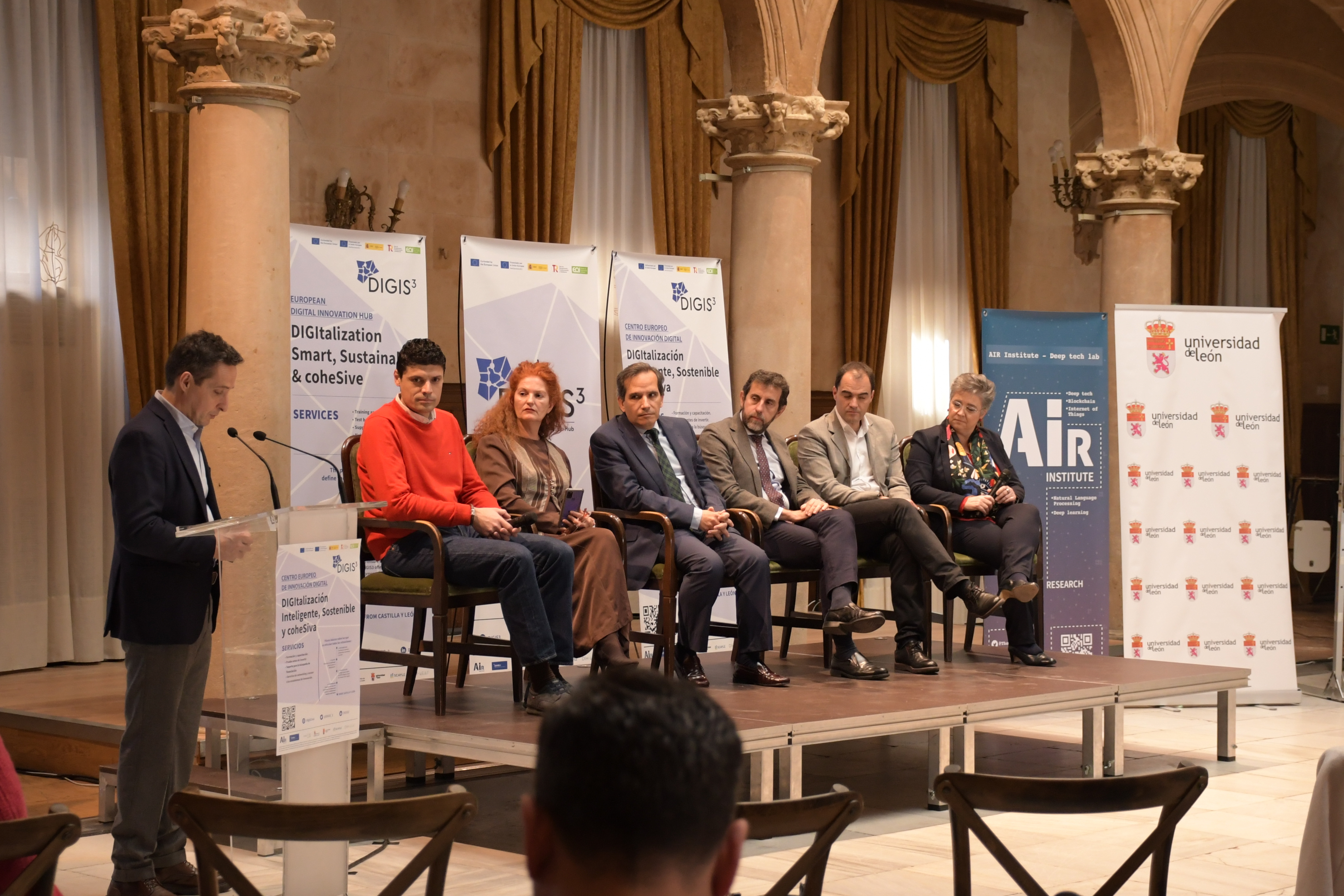The presentation event for DIGIS3, a consortium recognised as a European Digital Innovation Hub (EDIH) by the European Commission, was held this Monday at the Casino de Salamanca, which will use its capacity to help SMEs and public entities in Castilla y León to access EU funds for their digitisation.
The DIGIS3 programme will have 3,45 million euros to offer a portfolio of services that in a coordinated manner will meet the needs of the business fabric and the regional public administration and promote their digitisation. The services proposed within the consortium for the next three years are organised around four categories: Training, Testing and Experimentation, Support for the search for Sources of Funding and Innovation Ecosystem and Networks, capacities for which the partners are duly specialised, depending on the technologies considered and their main areas of application.

Objective and composition of DIGIS3
After achieving in 2022 the designation as European Centre for Digital Innovation, the general objective of DIGIS3 is to ensure the smart and sustainable digital transformation mainly of SMEs and the public sector of Castilla y León, with an urban and rural territorial scope focused on cohesion. Thus, it will benefit the business fabric of the nine provinces of Castilla y León in terms of technological support and ease of access to information, services and facilities.
The key is the integral accompaniment of users, facilitating their access to specialised technical knowledge and experimentation environments. It is structured as a one-stop service whose central core of knowledge and training is structured around Artificial Intelligence and Supercomputing, complemented by other support technologies in digitisation such as IoT, Big Data, Blockchain and Robotics, among others, without forgetting cybersecurity as an essential layer in any digitisation process.
DIGIS3 is formed by the collaboration of six regional entities: AIR Institute, the Instituto para la Competitividad Empresarial (ICE), the University of León, the Fundación Centro de Supercomputación de Castilla y León (SCAYLE), DIH-LEAF and DIHBU.
Statements
The presentation ceremony was attended by the Mayor of Salamanca, Carlos Manuel García Carbayo; the Regional Minister of Economy and Finance, Carlos Javier Fernández Carriedo, and the Regional Minister of Mobility and Digital Transformation, María González Corral. These authorities chaired the opening table of the meeting together with Juan Manuel Corchado, coordinator of DIGIS3 and president of the AIR Institute.
During his speech, Carlos García Carbayo pointed out that this project is perfectly aligned with the city's strategy, which aims to turn Salamanca into a development hub linked to innovation and the knowledge industry, complementing the current production model and generating new niches of opportunities and skilled employment. For his part, Carlos Fernández Carriedo stressed the need to promote digital transformation in the community to make the business fabric and SMEs even more competitive, achieve greater efficiency and productivity of companies and therefore a more resilient economy and greater territorial cohesion. Finally, María González Corral stressed the importance of Castilla y León having a supercomputer such as Caléndula and an entity such as SCAYLE in charge of its management, given that the calculation and storage capacity of this advanced technological tool is a fundamental lever for strengthening the business fabric by improving its competitiveness, boosting high-level research and attracting European funding.
Juan Manuel Corchado then took the floor to inform those present, including authorities from public, academic and private institutions in Castilla y León, about the services offered by DIGIS3 and to clarify its work plan: "Most of the services, which aim to carry out digitisation in the short term, will be offered at no cost to customers". Corchado assured that this process will be carried out in four phases or groups of services and gave figures: "DIGIS3 will drive the digital and green transformation of more than 1,400 SMEs and public entities in the region in the next three years".
Round table and closing
This was followed by a round table discussion on services and aid for companies in Castilla y León, made up of representatives from each of the consortium's entities: Augusto Cobos, general director of the Institute for Business Competitiveness (ICE); Nuria González Rabanal, director of the Business Relations Area of the University of León; Vicente Matellán, director of the Supercomputing Centre of Castilla y León (SCAYLE); Álvaro Herrero, president of DIH-LEAF; Belén Lanuza, manager of DIHBU, and Javier Prieto, co-founder and secretary of the AIR Institute.
At the end of the event, there was time to resolve doubts and queries about the role of DIGIS3 and the specific services it will provide, which include actions such as advice for the implementation of technologies and financing or support for access to networks and innovation ecosystems, among others.